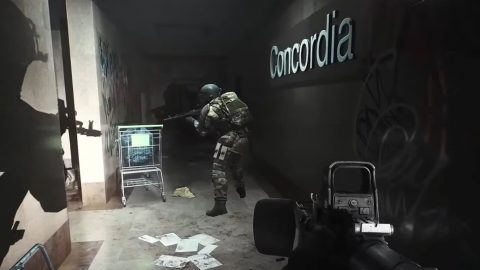
Kenneth Branagh hasn’t been home in years. Growing up in a working-class terrace in Belfast during the worst of The Troubles, his family moved to England in 1969 to escape the sectarian violence that was exploding all around them. Returning to the city for the first time in 2011, as one of the most celebrated stage and screen actors of his generation, he found the streets of his childhood had been torn down. “As my granny would say, I could feel myself filling up” he told The Guardian at the time.
Burying the memories again, Branagh spent the next decade directing and starring in some of the biggest blockbusters around (Thor, Jack Ryan: Shadow Recruit, Dunkirk, Tenet, Murder On The Orient Express) all the while nursing the raw emotions of that last return trip – filling up again with stories of his past, his family, and of the summer that changed his life forever.

“You know, there was just no getting away from feeling as though I had unfinished business with the place… It always drew me back,” Branagh tells NME now, chatting in a London hotel suite as his powerful new film, Belfast, finally retells the story of his own childhood.
“It’s been a place that calls to me all the time, even though really after the first few years of my career I don’t think the larger world had any sense that I was even from there. When I went back in 2011 I still felt as though there was a sort of identity crisis that was unresolved. Ireland and the Irish define so much of themselves in relation to home – it needs to be settled in some way. And I think making this film is a chance for me to go home in a sort of more honest way.”
“I felt like I was in an unresolved identity crisis”
Recasting his younger self as newcomer Jude Hill, with Caitríona Balfe (Ford v. Ferrari) and Jamie Dornan (Fifty Shades Of Grey) as his parents (plus long-time friend Dame Judi Dench as his granny), Branagh turned his own memories of the summer of ’69 into a heartfelt, uplifting family drama – a child’s eye view of the war in Northern Ireland and a love letter to the city that raised him. Already picking up a Golden Globe, leading the nominations at the Critics’ Choice Awards, and a firm favourite in the Oscars race, Belfast is on track to be one of the year’s biggest films, but it might not have happened at all if Brangah hadn’t had time on his hands to sit and reflect on the past.
“By the time we got to the beginning of the first lockdown I had this general sense of how precious time was – we just don’t know what the future holds anymore,” says Branagh, serious, thoughtful and quietly considered as he pauses to sip a glass of water. “I was approaching 60 and I just suddenly felt as though I had no choice but to try and tell this story.”

Wanting the film to feel as authentic to his own experience as possible, Branagh tried to keep the camera low throughout the shoot – doing everything he could to put the audience inside the head of a nine-year-old boy. “I wanted to stay in that perspective because I knew that I wasn’t capable of writing a film that attempted to sum up the complex nature of The Troubles” he says.
Although Belfast never shies away from showing what life was really like – local riots and smashed windows quickly turning to all-out war as the British army drive tanks through the barricades – Branagh keeps the focus on little “Buddy”. That means many scenes are filled with innocuous fare like nicking a chocolate bar from the local corner shop or getting excited about a trip to the cinema.

Filmed in stark black and white, Belfast bursts into colour whenever Buddy watches a film. These memories are still the most vibrant of Branagh’s childhood. They are when he fell in love with the artform that would later become his own.
“Cinema changed my life,” says Branagh, now with five Oscar nominations under his belt after a career spent at the top of his game making Shakespeare adaptations, starring in Harry Potter movies, becoming Christopher Nolan’s muse and directing for Marvel and Disney. “I mean, I didn’t know it was happening at the time. Those stories started to give me a frame in which I could understand some of the madness that was happening around me growing up.
“Cinema helped me understand the madness of The Troubles”
“Going to the cinema was a ritual for me in Belfast. They were these massive temples full of popcorn and lemonade and these massive screens with massive sound and stories and colour and immersion in places and with people I’d never seen before. This relationship to storytelling was very critical to me, and it engaged me completely. The cinema blew my mind, and I think when the violence started it was a way of attempting to understand it.”
Keeping that violence in the background as much as possible, Branagh’s masterstroke is the way he turns one of the darkest periods of Irish history into a surprisingly light-hearted coming of age film. Judi Dench melts hearts as the loveable old granny, Balfe and Dornan break out into impromptu street dances, and little Jude Hill steals the whole thing as a kid more excited about his Thunderbirds costume than he is worried about the bricks being thrown through the front window. Belfast is the sweetest war movie you’ll ever see.

“When you find yourself on high alert, when your family and everyone around you falls into this wake of violence, everything else gets heightened and becomes extremely precious,” says Branagh. “It made people very emotional. And that was my experience. I think I was tenderised by the onset of The Troubles. There’s a piece in the film where Buddy is outside playing when Van Morrison is singing ‘Days Like This’ on the radio, and those moments were ones that had a sort of intensified sweetness for me at the time, because they were so endangered.”
For Branagh, there was no better way to sum up the emotion of those memories than with music. He poured through his record collection to find the perfect track for each scene. One early version of the film featured a dozen different artists of the time, but as soon as he started listening back to Van Morrison’s ’60s albums he knew he’d found the solo voice Belfast needed.

“This film takes place in ’69 and Van Morrison had ‘Astral Weeks’ in the charts around the world for nearly two years at that point,” says Branagh. “This man was out there quoting Belfast street names in his music, and he was seen as this radical cultural ambassador for the city. The man’s voice was so particular and so much part of the soul of the city, and of those kinds of people, so it just felt right really.” Going a step further, Branagh sent Van Morrison an early version of the script and asked him if he’d be interested in writing something new for the film. Three weeks later, ‘Down To Joy’ arrived. Already shortlisted for Best Original Song at the 2022 Oscars, Van Morrison’s new track joined eight of his others on the film’s soundtrack, along with a new orchestral score that Branagh wasn’t even expecting.
“I casually asked whether he maybe heard any saxophone in this story and he sent back 20 minutes of sax and electric piano score,” laughs Branagh. “It seems very much in tune with the way he describes himself as a ‘corner boy’, as that’s where his music was first learned and listened to. And he still has a lot of that in him. As he does with so much of his music he managed to make the superficially hummable seem deeper and more complex.”

Although Van Morrison fills the film’s soundtrack, it’s not one of his songs that you come out singing. Ending Belfast with a big, brassy dance number – Jamie Dornan covers ‘60s standard ‘Everlasting Love’ in a feel-good finale that felt as much of a release for the cast as it does for the audience watching.
“That scene was just amazing,” remembers Branagh. “We were filming in the time of COVID so all the cast and crew were in their own bubbles most of the time. When we got to do that musical number, though, we were able to be a little bit physically closer together than we’d been for some time. And although we had the doors open everywhere, and we had everyone out of that place as soon as we called cut, there was such a sense of being back at the party we had all been denied for a very long time. And that there was tremendous relief in that.”
Coming as it does after the film’s most painful moments, it’s a release that you don’t see coming. Few other films about the Northern Irish war dare to end with a bit of karaoke. “I remember my own father when his father died,” says Branagh, taking time to gather his thoughts. “He spent five days sleeping in the same room as the open casket. And that was a tough thing for him to do while everybody came and visited the body every day and drank. By the time he got to the weekend, you know, he really needed to let off some steam I think, and I remember it was a really wild celebration, a sort of grasping of life after committing to feeling so much loss. Sometimes you just need to sing your lungs out and dance your feet off.”
“I wish my parents could have been around to see ‘Belfast’”
With the film now finished, how has making Belfast changed Branagh’s relationship with his own past? From the day he spent walking around the wreckage of his childhood neighbourhood back in 2011, to the day he dared to show the script to his brother and sister, Branagh’s story has been his own personal journey back to the summer of 1969 – and his own attempt to understand the sacrifices his parents made at the time.
“I think that my admiration for my parents’ courage has intensified,” he says, looking back over the whole experience. “I realised when I made the film that we had never spoken about any of it before as a family. We never spoke about what that violence had meant, or how difficult it had been to come from Belfast. And I think it was because indulging in any so-called ‘suffering’ was against our nature.
“I believe the sacrifice was huge for them. Belfast was a place they loved. It was an environment and a family that they felt secure in. But I also think now about what that time did to their hearts. There was a big price to pay from which they never really recovered. I think they felt that separation all of their days. I wish they could have been around to see this film… Maybe that would have made a kind of difference that they might have appreciated.”
‘Belfast’ is released in UK cinemas on January 21
The post Kenneth Branagh: “Making ‘Belfast’ was a chance for me to go home” appeared first on NME.






